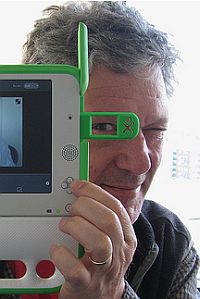Technology Salon: A Community of Practice
In April of 2008, I started the Technology Salon as a forum where technology and development professionals could share there opinions on emerging trends in information and communication technologies and international development in an intimate and informal discussion around:
- technology’s impact on donor-sponsored technical assistance delivery, and
- private enterprise driven economic development, facilitated by technology.
Now, almost a year later, the Technology Salon is developing into a real community of practice – a network of development and technology professionals who share a common passion for ICT4D, and through regular interaction and communication, are improving their knowledge and implementation expertise in empowering development with technology.
From its inception and reinforced through feedback from its participants, I’ve found there are three attributes keys to the Technology Salon success and growth:
- Conversation, not presentation
The Technology Salon is primarily a forum for discussion, so presentations are discouraged and Power Point is generally banned. Speakers have only 10-15 minutes at the beginning to present their activity, before participants are free to ask questions, share their own experiences, and drive the conversation in a direction that interests them. This both brings forth the group’s knowledge and keeps participants engaged for the full meeting. - Intimacy of participants:
The Technology Salon attendance is capped at 15 people to make sure each participant has the opportunity to speak and share their experience. This cap also encourages pre-registration and subsequent attendance. Last but not least, it allows for quality pre-and post-event networking by participants. - Confidentiality of opinions:
The Technology Salon employs the Chatham House Rule – what is said in its discussions can only be attributed to the Salon itself, not to any specific participant. At the same time, the Salon is not recorded nor the discussion transmitted outside its meeting place. These precautions allow participants to speak their opinions freely, thoughts that would not be shared if participants worried about attribution or out-of-context quoting.
In 2009, I look to improve on the Technology Salon’s success while maintaining its three key attributes – conversation, intimacy, privacy. Its goal is to evolve beyond its current exclusive nature into a standard of discourse between technology and development professionals. To achieve this greater scale and legitimacy, and make its impact felt beyond its direct participants, the Technology Salon will need to improve its:
- Event promotion:
The Technology Salon has grown organically, mainly through word of mouth and a small announce-only email list I manage. It could benefit from a larger promotion in the technology and development space, reaching practitioners who as yet have not heard of it, and attracting higher-profile speakers and attendees. At the same time, this new interested needs to be balanced with the intimacy that differentiates the Salon. - Meeting regularity:
Owing to its informal nature and my hectic travel schedule, the Technology Salon meeting have been ad-hoc – scheduled with speakers are available or a topic of interest presents itself. The only regularity has been its timing – on a Thursday from 8:30am to 10am. For it to become a fixture in professional life, it needs to have a regular schedule, but one that can be balanced against the opportunity for guest speakers and capturing of fast-moving topics. - Publication of outcomes:
Until recently, the Technology Salon has been forcefully off-the-record. Few if any details of the Salon or its conversation points have been documented or shared publicly. For the Salon to have a larger impact, it needs to publish more of its outcomes – be they points of consideration and interest vs. formal pronouncements or conclusions. Yet this grater transparency needs to be balanced carefully with the need for confidentiality for individual participants – which if anything, seems to be the key success metric to date. - Sponsorship:
To date, the Technology Salon has enjoyed informal sponsorship by its host, the UN Foundation. For it to gain greater legitimacy as a professional forum, it needs to have a formal organizational sponsor that allows the Salon affiliation and yet autonomy in topics and conversation – so that the Salon remains driven primarily by its participants.
And in the spirit of its participant-driven organization, I encourage your ideas and suggestions for improvement, especially if they can help me with the four areas I want to focus on for 2009: publicity, regularity, publication, and sponsorship.
Better yet, are there topics of ICT4D interest you’d like to see at an upcoming Salon, where you can also provide the speaker?


